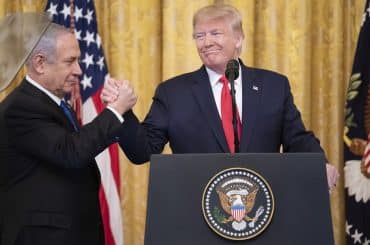This post is part of Marc H. Ellis’s “Exile and the Prophetic” feature for Mondoweiss. To read the entire series visit the archive page.
Now Isaiah knows. What shall he do about the wonderful book, assigned as required reading, authored by a convinced Nazi? Telling what he knows lands Isaiah right in the lap of his quite extraordinary teacher. If he speaks what he knows, will the Nazi connection be seen as relevant or special pleading? After all, the Nazi, Martin Heidegger, another highly educated university professor, is still taught in the rarified philosophical atmosphere of our major universities.
Isaiah’s first response ran like this: “Well, Dad-o, it sure is troubling. I must point out though that ‘true Zen illumination, or satori’ has to do with one’s enlightenment in a singular moment, regarding a singular focus of mediation – so this illumination seems to not be permanent.” But, of course, the issue isn’t with Herrigel. The issue is the persistence of literature authored by Nazis, as if books have no history or as if this history is irrelevant.
But, then, if we take the Ethnic Cleansing and Worse Road of political correctness all the way to the end, shall we ban Jewish-Israeli authors who cleansed Palestinians or stood idly by while it happened? Should the Jewish American authors who have remained silent or worse, actively enabled Israeli hegemony like Elie Wiesel and and more or less any contemporary Jewish writer on the Holocaust, philosophy, Jewish history, also be banned?
Since most publishers and Jewish authors are mum on the Palestinians, the ban might include those incredibly expensive Holocaust text books that authors and publishers thrive on. It might also mean that every course on the Holocaust be mandated to include a section on Palestine during the Nazi era and that every Holocaust course discuss the aftermath of the Holocaust include the aftermath of the creation of the state of Israel on Palestinians.
Sounds like a Herculean effort that leads to another road. We might be returning to Highway 61 from another direction.
I can’t imagine teaching the Founding Fathers without including their slave-holding or the ethnic cleansing of Native Americans. Sure the basics are still taught. Now, however, the basics are augmented, with extras included. Like the slavery of Africans and ethnic cleansing of Native Americans. I doubt, though, that African Americans and Native Americans think they’re extras in the American drama. Like Palestinians, they probably think they’re central actors without which the drama doesn’t make sense. Imagine that.
I can’t imagine Palestinians being included as extras in the study of the Holocaust and its aftermath. Even if they think they’re central in how the Holocaust functions, a major reason the Holocaust is central in the American educational curriculum is to make sure Palestinians are entrenched in the American imagination as terrorists. Obviously, it can’t be the Holocaust itself that makes it central to contemporary American education. There are other events of great magnitude that don’t have their own course set-aside.
Yes I am aware of the recent writings on the Arabs, including the Palestinians, regarding their views on Nazi Germany and Jews during that time. Most literature I’ve seen is aimed to bolster political support for a “beleaguered” Israel. Its aim is to show that Arabs are anti-Semitic rather than having a real political beef with a colonial (Jewish) movement that was about to take over Palestine.
Starting in the late 1800s, the early Zionist writers in Europe thought Jewish life in Europe would be limited in the future or worse. They feared there would be no room for Jews in the evolving European landscape. They were prescient. The Palestinians and Arabs outside of Palestine also predicted calamity regarding the burgeoning numbers of Jewish settlers reaching their shores. They, too, were prescient. Soon Jewish books were being rescued in the aftermath of the Holocaust. Soon Palestinian books were being “collected” in the aftermath of the Nakba.
It’s all too familiar. And depressing. Among my favorite books I read in my Introduction to Religion course many years ago were Mircea Eliade’s, The Sacred and the Profane and Myth and Reality. At that point, Eliade’s past was safely hidden from view. Prior to his coming to the United States after the war, Eliade was an enthusiastic member and intellectual savant of the Iron Guard, a fascist and anti-Semitic organization in his native Romania. During World War II, Eliade also associated with Nazi collaborationists in Vichy France and Franco’s Spain. Like the Nazi scientists that built the American space program, Eliade embraced America as the land of second chances.
When I read his books, Eliade was at the pinnacle of his career, hanging out at the vaunted University of Chicago. So universities go. He never lost his standing. In the American Academy of Religion. A giant! Now that I know, how do I deal with my early fascination with the Eliade’s writings? Would I assign them to my students?
I just looked up another of the German romantics that was huge in my university life and many other young Jews of that time period – Herman Hesse. In college, I had a number of his books, more than a twenty, I think. Hesse’s wanderings went well with the music of Bob Dylan and Neil Young. A time of searching, aloneness, spirituality, love and alienation, all wrapped up into one Rolling Thunder Review (which I saw, by the way, in Tallahassee, at the old basketball gym in 1975.)
Hesse passes the Nazi test. By the time the Nazis rose to power, Hesse was living in Switzerland, that bastion of (un)neutrality. Hesse aided Berthold Brecht and Thomas Mann, both opponents of Nazism, as they came across the border into exile. Hesse’s third wife was Jewish; he publicly condemned anti-Semitism early on. In the 1930s, German publications stopped publishing his work. Eventually the Nazis banned his writing.
You see, German romanticism was huge during that period. It moved in different directions, as all things do – toward empire or community. During the 1930s, romanticism travelled toward or away from the Nazis. But then, the attraction to the land of Israel was also part of this German and, in general, European romanticism.
Martin Buber was highly influenced by this trend. On the one hand, it moved him to reject fascism and embrace a Jewish communal sense in Palestine. On the other hand, Buber’s romanticism had little room for Palestinians as rooted in the land. True, Buber opposed the Jewish state and argued against the injustices done to Palestinians. At the same time, he claimed Jewish priority in the land. The reason was a romanticized one. Jews were joined to the land though Israel’s origins in a way that Palestinians could not be. The Jewish “return” to “our” land was essential to the recovery of Jewishness being lost in the Diaspora.
The Catholic Worker movement in the United States also embodied aspects of European romanticism toward the land. However, this was tempered by service to the poor and adopting a life of poverty. Choosing community, the Catholic Worker became a radical, anarchistic and pacifist community. God works in mysterious ways.
Here is the dilemma for my Isaiah, my little one who isn’t little at all. Now that he knows that the Zen mind can go empire and since he knows that Jewish can and has gone empire, what is he going to do with the neon “No Exit” sign flashing in front of him?


“Should the Jewish American authors who have remained silent or worse, actively enabled Israeli hegemony like Elie Wiesel and and more or less any contemporary Jewish writer on the Holocaust, philosophy, Jewish history, also be banned?”
Well, banning books is not easy. A fierce form of BDS indeed!
But if you are going to consider it, why limit it to people who profess to be Jews? Why not ban the books (and burn the newspapers) that ACT like Zionists or who ACT like Jews who should have spoken and instead were silent? Shouldn’t the NYT be buried in a deep hole for its refusal to tell what it knows or should know about I/P?
zionists of whatever religious/political persuasion & their enablers should be required to attend reeducation classes and to perform community services for palestinian organizations. zionists themselves shoud bear the cost of their reeducation.
Professor Ellis!
Hello again, I hope you are well. It is enjoyable for me to think over your writings.
I am a bit confused over what you mean in the second part of your statement:
“The Catholic Worker movement in the United States also embodied aspects of European romanticism toward the land.“
In your previous sentences, you were referring to the Holy Land as “the land” and the Zionist romanticism of Jews returning to their ancient homeland. So here when you talk about romanticism about the land, I guess you could mean that the Catholic worker movement also felt this way about national immigration, and that it was tempered by service to the poor.
But here you specifically talk about “European” romanticism toward the land, and you don’t specify what land it is, so part of me thinks you could mean European nationalist “patriotic” ideas that the Catholic Worker would have about their own land, America, and that this patriotism was tempered by their service to the poor.
You have alot of experience with the Catholic Worker movement, having been in it for years, so I’m sure you know what you are talking about. But I wasn’t able to find anything in a typical internet search saying the Catholic Worker group romanticized Jewish emigration to the Holy Land. That is not to say they didn’t, naturally.
And I assume their American patriotism was probably similar to other economically-radical charities. Meaning they wanted their country to prosper and be moral, but they didn’t think their nationality itself was better than others. For example, they might think America’s system was better in terms of constitutional ideals, but not necessarily better in terms of economic justice.
Regards.